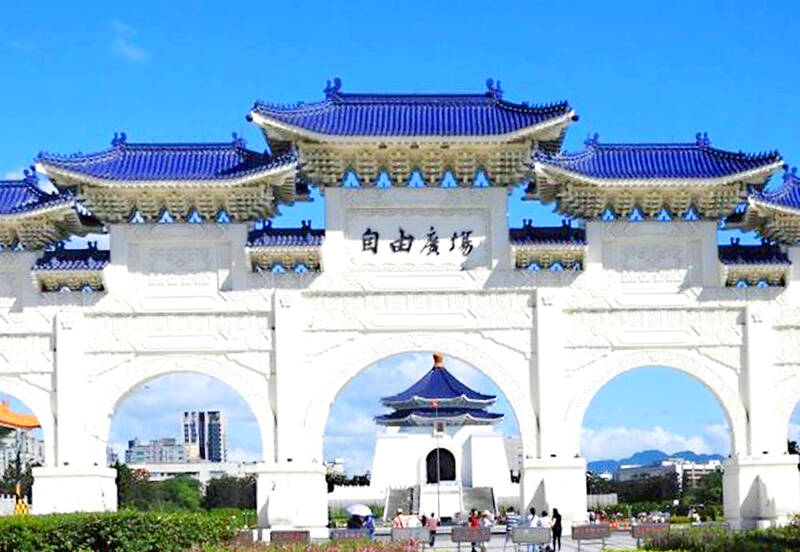The government has no immediate plans to demolish the Chiang Kai-shek Memorial Hall as part of transitional justice efforts, but it is focused on removing symbols of authoritarianism, Premier Chen Chien-jen (陳建仁) said yesterday.
Chen was responding to a question on whether the government planned to tear down the controversial memorial site before a new president takes office on May 20 next year.
In an opinion piece published on Sunday in the Chinese-language Liberty Times (the Taipei Times’ sister newspaper), members of a Cabinet-level task force seeking ways to repurpose the hall — former political prisoner Lu Yu (呂昱), National Taiwan University associate professor Huang Shu-mei (黃舒楣) and former Transitional Justice Commission member Yeh Hung-ling (葉虹靈) — said that little progress has been made on the issue due to a lack of political will.

Photo: Photo: Chen Yu-fu, Taipei Times
“In pursuit of transitional justice, it is crucial to remove symbols of authoritarian regimes and stop promoting a cult of personality. A task force has been established to study alternative uses of the Chiang Kai-Shek Memorial Hall, and President Tsai Ing-wen (蔡英文) has also expressed hope that the government would make progress on the matter before her term ends next year,” Chen said.
“Discussions over repurposing the Chiang Kai-Shek Memorial Hall are comprehensive and ongoing, and we have yet to draw a conclusion that the architecture would be torn down soon... We would gather input from all stakeholders and look into relevant issues, and any progress made in that regard would be announced,” he said.
Separately, Vice Premier Cheng Wen-tsan (鄭文燦) said that the Executive Yuan is exploring a few options, but a plan would not be announced until a consensus has been reached.
The task force was formed to address various issues, such as how to remove symbols of authoritarianism and cult of personality, and what to do with the spaces once they are removed, Cheng said.
The Executive Yuan is amending laws related to transitional justice, such as the Political Archives Act (政治檔案條例), and proposing an act governing the preservation of sites where injustices occurred, he said, adding that they would be announced following a careful review.
Executive Yuan spokesman Lin Tze-luen (林子倫) on Sunday said that the transformation of the Chiang Kai-Shek Memorial Hall is the cornerstone of the Cabinet’s transitional justice efforts and requires comprehensive planning.
“We thank the three task force members for raising their concerns about the progress made on the matter. We will continue gathering opinions, consolidate positions of government agencies and consider all possible ramifications in the most cautious manner possible,” Lin said. “We are also seeking the best opportunities to pursue transitional justice.”
Cheng and Minister Without Portfolio Lo Ping-cheng (羅秉成) presided over the task force’s meetings, he said, adding that Minister of Culture Shih Che (史哲) and Minister of the Interior Lin Yu-chang (林右昌) also participated.
The Executive Yuan’s determination to pursue transitional justice is no different from three task force members who wrote the op-ed, he said.
Following a meeting in May, the task force asked the Ministry of Culture to propose options for repurposing the Chiang Kai-Shek Memorial Hall and to communicate with the public about them, he said.

A preclearance service to facilitate entry for people traveling to select airports in Japan would be available from Thursday next week to Feb. 25 at Taiwan Taoyuan International Airport, Taoyuan International Airport Corp (TIAC) said on Tuesday. The service was first made available to Taiwanese travelers throughout the winter vacation of 2024 and during the Lunar New Year holiday. In addition to flights to the Japanese cities of Hakodate, Asahikawa, Akita, Sendai, Niigata, Okayama, Takamatsu, Kumamoto and Kagoshima, the service would be available to travelers to Kobe and Oita. The service can be accessed by passengers of 15 flight routes operated by

GIVE AND TAKE: Blood demand continues to rise each year, while fewer young donors are available due to the nation’s falling birthrate, a doctor said Blood donors can redeem points earned from donations to obtain limited edition Formosan black bear travel mugs, the Kaohsiung Blood Center said yesterday, as it announced a goal of stocking 20,000 units of blood prior to the Lunar New Year. The last month of the lunar year is National Blood Donation Month, when local centers seek to stockpile blood for use during the Lunar New Year holiday. The blood demand in southern Taiwan — including Tainan and Kaohsiung, as well as Chiayi, Pingtung, Penghu and Taitung counties — is about 2,000 units per day, the center said. The donation campaign aims to boost

ENHANCING EFFICIENCY: The apron can accommodate 16 airplanes overnight at Taoyuan airport while work on the third runway continues, the transport minister said A new temporary overnight parking apron at Taiwan Taoyuan International Airport is to start operating on Friday next week to boost operational efficiency while the third runway is being constructed, the Ministry of Transportation and Communications said yesterday. The apron — one of the crucial projects in the construction of the third runway — can accommodate 16 aircraft overnight at the nation’s largest international airport, Minister of Transportation and Communications Chen Shih-kai (陳世凱) told reporters while inspecting the new facility yesterday morning. Aside from providing the airport operator with greater flexibility in aircraft parking during the third runway construction,

American climber Alex Honnold is to attempt a free climb of Taipei 101 today at 9am, with traffic closures around the skyscraper. To accommodate the climb attempt and filming, the Taipei Department of Transportation said traffic controls would be enforced around the Taipei 101 area. If weather conditions delay the climb, the restrictions would be pushed back to tomorrow. Traffic controls would be in place today from 7am to 11am around the Taipei 101 area, the department said. Songzhi Road would be fully closed in both directions between Songlian Road and Xinyi Road Sec 5, it said, adding that bidirectional traffic controls would